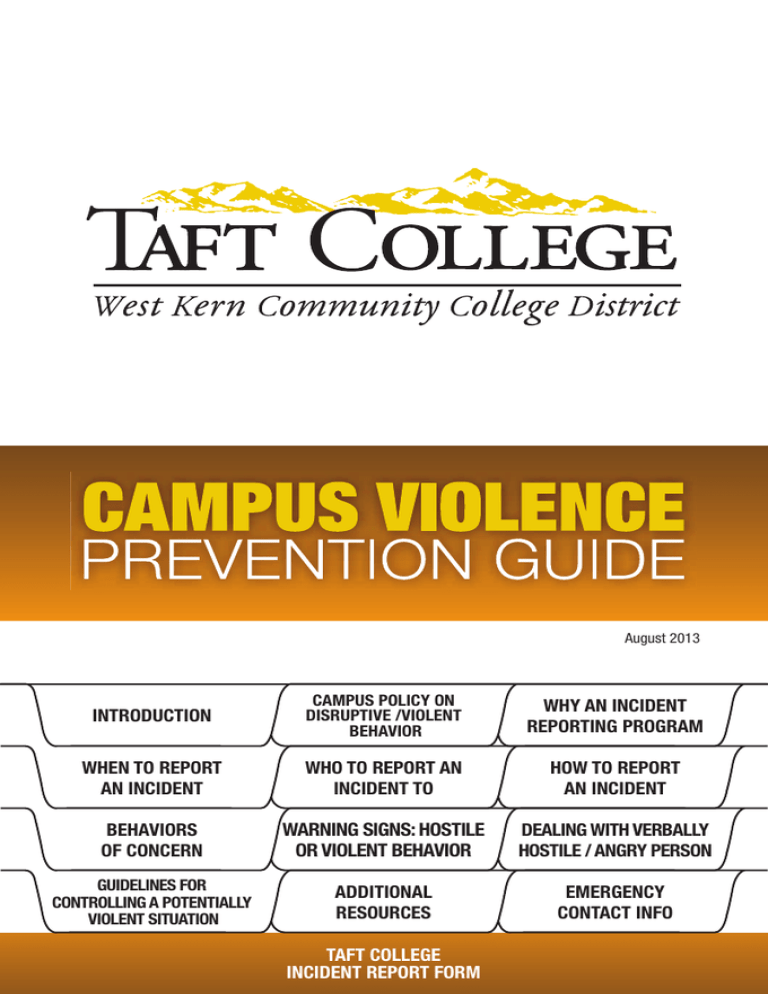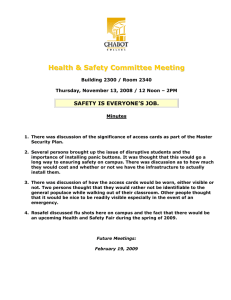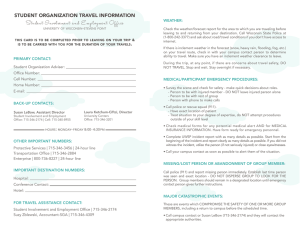WHY AN INCIDENT INTRODUCTION REPORTING PROGRAM WHEN TO REPORT
advertisement

August 2013 INTRODUCTION CAMPUS POLICY ON DISRUPTIVE /VIOLENT BEHAVIOR WHY AN INCIDENT REPORTING PROGRAM WHEN TO REPORT AN INCIDENT WHO TO REPORT AN INCIDENT TO HOW TO REPORT AN INCIDENT BEHAVIORS OF CONCERN WARNING SIGNS: HOSTILE OR VIOLENT BEHAVIOR DEALING WITH VERBALLY HOSTILE / ANGRY PERSON GUIDELINES FOR CONTROLLING A POTENTIALLY VIOLENT SITUATION ADDITIONAL RESOURCES EMERGENCY CONTACT INFO TAFT COLLEGE INCIDENT REPORT FORM Proudly manufactured in the USA www.WellSpringInfo.com 800-268-3682 MESSAGE FROM THE TAFT COLLEGE VICE PRESIDENT OF STUDENT SERVICES The West Kern Community College District is committed to an educational environment in which all students, faculty, staff, and visitors are treated with respect and dignity. In an effort to make Taft College the safest possible environment in which to work and learn, we have prepared this Campus Violence Prevention Guidebook as a safety net in case of a violent emergency. Please read the guide carefully and be aware of your right to learn and work in safety. Thank you for all you do to keep our campus safe. Darcy Bogle Vice President of Student Services INTRODUCTION CAMPUS POLICY ON DISRUPTIVE/VIOLENT BEHAVIOR Taft College is committed to creating and maintaining a safe working, learning, and social environment for all students, employees, and visitors which is free from violence, threats, intimidation, hostile acts, and disruptive behavior. Civility, understanding, and mutual respect toward all persons are intrinsic to the existence of a safe and healthy campus. Threats or acts of violence, or hostile, intimidating or disruptive behavior not only impact the individuals concerned, but also the academic community. Taft College prohibits acts or threats of violence, and any person who commits such acts is subject to disciplinary action, and/or civil or criminal prosecution. Taft College has zero tolerance for potentially violent or violent acts against any member of the campus environment or against any property. For purposes of this policy, violence, threats of violence, and other inappropriate behavior include, but are not limited to: ➣ Any act that is physically or emotionally assaultive; or ➣ Any threat, behavior, or action which is interpreted by a reasonable person to carry the potential of: • harming or endangering the safety of others; • resulting in an act of aggression; • destroying or damaging property. Continued CAMPUS POLICY ON DISRUPTIVE /VIOLENT BEHAVIOR CAMPUS POLICY ON DISRUPTIVE/VIOLENT BEHAVIOR continued If you are in a place where you may become more directly threatened or involved, the following steps are recommended: • • • • • • • • Go to the nearest room or office Close and lock or barricade the door by any possible means. Stay away from doors or windows where you might be seen. Turn off radios, computers or anything else that might draw attention. Leave interior room lights off. Get into the most secure place/position you can find. Remain quiet and hidden. DO NOT ANSWER THE DOOR unless you know it is emergency personnel. Notify 911 Established student, personnel, and public safety procedures will serve as the mechanisms for resolving such situations. Each incident will be taken very seriously and may be reported to, and records maintained in, the Office of Student Services. Members of the campus community are encouraged to report to Campus Security Authorities acts of violence, threats of violence, or any other behavior which by intent, act, or outcome could harm another person or property. Individuals who severely disrupt classrooms, offices, or common spaces may be removed from the campus. Administration may deny class enrollment to a student whose behavior compromises the learning environment. WHY AN INCIDENT REPORTING PROGRAM? Taft College is committed to a zero tolerance policy for disruptive and potentially violent behavior. To ensure the campus is aware of events that may lead to a crisis, an Incident Reporting Program has been designed to centralize information pertaining to disruptive or potentially violent behavior. Through your reports, the campus becomes aware of potentially violent behavior that may be occurring on the campus. The incident reports may then be used to assess problem situations and their potential for dangerous outcomes. Any one occurrence may seem minor, but a number of incidents may indicate a need for campus action. Campus-wide participation assures that accurate information is available and that, should they be needed, appropriate interventions are implemented. With your willingness to cooperate, Taft College can maintain an environment that is safe for all members of the academic community. WHY AN INCIDENT REPORTING PROGRAM WHEN TO REPORT AN INCIDENT, CRIME OR EMERGENCY • • • • • If someone is injured or ill If you see or smell smoke or fire If you see someone being hurt, harassed or bullied If you see a crime in progress such as someone stealing, causing damage, driving while under the influence of any substance that impairs their ability to safely operate a vehicle, or any activity that is against the law. If you see something or someone suspicious. Do not assume someone else has made or will make the call. Provide the officer(s) or dispatcher(s) with accurate, detailed information about the situation so that it can be relayed to the emergency personnel who are on the way to assist. If you are reporting a medical problem, ask someone to monitor the affected person’s condition so you can relay the information to the Officer(s). Campus Security Authorities must report an Incident or Crime by Federal Law, the CLERY ACT passed in 1998. • CSA’s are defined by function and not by title. If you are an employee of the college and have been designated as a CSA, you must report a crime if witnessed by you or reported to you. (Source: http://www.securityoncampus.org/) WHEN TO REPORT AN INCIDENT WHO TO REPORT AN INCIDENT TO Who Do I Report An Incident To? Campus Security Authorities: According to the federal law known as the Jeanne Clery Disclosure of Campus Security Police and Campus Crime Statistics Act, a “Campus Security Authority” is defined as “An official of an institution who has significant responsibility for student and campus activities, including, but not limited to, student discipline and campus judicial proceedings.” The following individuals have been identified as Taft College Campus Security Authorities (CSAs): Vice President of Student Services Assistant to the Vice President of Student Services Counselors / Advisors Club Advisors Director of Athletics / Coaches Residence Advisors Residence Hall Supervisor Security Officers Title IX Coordinator WHO TO REPORT AN INCIDENT TO HOW TO REPORT AN INCIDENT How Do I Proceed if I Wish to Report an Incident? If you observe, or are the target of, a disruptive or violent incident, please: • Complete an Incident Report Form and turn it in to an identified Taft College Campus Security Authority. • Your report will be assessed and forwarded to campus security where it will be used for further assessment of potential risk. • Incident Forms will then be filed and kept for future reference according to State Records, Retention, and Disposition Policy. • If immediate action is indicated by your report, appropriate campus offices will be notified and response initiated. Remember, if an incident is clearly severe, call Campus Security immediately! Do not wait for the incident report to be completed and routed. HOW TO REPORT AN INCIDENT DEALING WITH POOR CONTACT WITH REALITY How Do I Deal With a Student or Employee in Poor Contact with Reality? These individuals have difficulty distinguishing fantasy from reality, the dream from the waking state. Their thinking is typically illogical, confused, or irrational. Their emotional responses may be incongruent or inappropriate and their behavior may be bizarre and disturbing. This person may experience hallucinations, often auditory, and will report hearing voices. While this person may elicit alarm or fear from others, he/she is generally not dangerous and is more frightened and overwhelmed by you than you are by him/her. If you cannot make sense of the conversation, this person may be in trouble. Do: • Respond with warmth and kindness, but with firm reasoning. Speak slowly and clearly in short sentences. • Remove extra stimulation from the environment (turn off radio, step outside of a noisy classroom). • Acknowledge your concerns and say that you can see they are distressed. • Acknowledge their feelings or fears without supporting the misperceptions, for example, “I understand you think someone is following you, but I don’t see anyone and I believe you’re safe.” • Focus on the “here and now”. Ask for specific information about the person’s awareness of time, place, and destination. • Speak to their healthy side, which they have. It’s okay to laugh and joke when appropriate. • Contact the Counseling Center to enlist aid in helping the individual to obtain appropriate care—661-763-7748. Continued BEHAVIORS OF CONCERN DEALING WITH POOR CONTACT WITH REALITY continued Don’t: • Argue or try to convince them of the irrationally of their thinking as this commonly produces a stronger defense of the false perceptions. • Play along, for example, “Oh yeah, I hear the voices (or see the devil).” • Encourage further discussion of the delusional process. • Demand, command, or order. • Expect customary emotional responses. RECOGNIZING SIGNS FOR INDIVIDUALS WITH A POTENTIAL FOR VIOLENCE How Do I Recognize the Warning Signs of Individuals With a Potential for Violence? Violence, because of emotional distress, is rare and typically occurs when the individual’s level of frustration has been so intense that it erodes emotional controls. The risk of on-campus violence can be minimized by the careful observation of behavior. Specific stress factors, behavior, and personality traits have been associated, after the fact, with almost every incident of on-campus violence. The presence of several of these indicators greatly increases the likelihood of violent actions. Most people will not just “snap”. An escalating series of clues usually precedes violence. The risk of a violent outburst is generally increased when the following warning signs are ignored: • Boundary crossing, such as pushing the limits of acceptable on-campus behavior and continual testing of established rules. • Chemical dependence upon alcohol and/or drugs that may agitate or create paranoia and aggressive behavior. • Concentration problems such as difficulty recalling instructions, forgetfulness, repetition of errors, and staring into space. • Depression may cause sufferers to commit a violent act either upon themselves or others. Symptoms of depression include: despair, ambivalence, slowed work pace, continual sad or blank facial expressions, withdrawal, self-condemnation and self-destructive behavior, hopelessness, helplessness, inappropriate guilt/shame, and poor personal hygiene. • History of violence including domestic violence. • Violent fantasies, delusions, or paranoia. • Inconsistent work patterns and attendance problems. • Obsessive interest in weapons and violent incidents. Continued WARNING SIGNS: HOSTILE OR VIOLENT BEHAVIOR RECOGNIZING SIGNS FOR INDIVIDUALS WITH A POTENTIAL FOR VIOLENCE continued • Obsession with school or job causes a deeper sense of loss in the case of poor classroom performance or workplace review or termination. These individuals may be loners, having little else of importance in their lives. • Pathological blamers that cannot take responsibility for their own actions, will not admit wrong-doing, even for minor mistakes, and blame of other people, the organization, or the system. • Ongoing harassment of colleagues. • Deteriorating physical appearance and poor self-care. DEALING WITH VERBALLY HOSTILE / ANGRY PERSON How Do I Deal With a Verbally Hostile or Angry Student or Employee? Individuals may become verbally abusive when they are in frustrating situations which they see as being beyond their control. Anger and frustration are displaced from those situations onto the nearest target. Explosive outbursts or ongoing belligerent hostile behavior become this person’s way of gaining power and control in an otherwise out-of-control experience. It is important to remember that the person is generally not angry at you personally, but is angry at her/his world and you are the object of pent-up frustrations. This behavior may be associated with the use of alcohol and other drugs. Do: • Acknowledge their anger and frustration, for example, “I understand how angry you are.” • Rephrase what they are saying and identify their emotion—“I can see how upset you are because you feel your rights are being violated and nobody will listen.” • Reduce stimulation. Invite the person to a quiet place that is safe and within hearing distance of a colleague. • Allow him/her to vent but set limits. Let the person get his/her feelings out and tell you what is upsetting him/her. • Be direct and firm about the behavior you will accept. “Please stand back, you’re too close.” “I can’t listen to you when you yell and scream at me that way.” “Let’s invite _____ in to discuss this further.” • Help the person problem-solve and deal with the real issues when response becomes calmer. • Alert campus security or the appropriate campus office if the situation appears to have the potential for violence or severe disruption to the campus climate. Continued DEALING WITH VERBALLY HOSTILE / ANGRY PERSON DEALING WITH VERBALLY HOSTILE / ANGRY PERSON Don’t: • Get into an argument or shouting match. • Become hostile or punitive yourself. • Press for explanations of the person’s behavior. • Ignore the situation. • Touch the person. GUIDELINES FOR CONTROLLING A POTENTIALLY VIOLENT SITUATION What are the Guidelines for Controlling a Potentially Violent Situation? Do not meet with anyone who has threatened you or is an obvious danger to you. When meeting with a difficult student, coworker, or campus visitor observe the following: 1. Alert a colleague that you will be meeting with the potentially violent person and have that colleague ready to assist. Have a campus security officer “on call” or with you as circumstances dictate. 2. Keep the door of your meeting place open and position yourself in an area that gives you easy exit. 3. Move away any objects that can be used as a weapon. 4. Terminate the session immediately if your “sixth sense” tells you something is wrong. 5. Avoid body language that appears challenging such as placing your hands on your hips, moving into the other person’s territory, or using aggressive facial expressions. 6. Slow your speaking rate down and use a low pitch and volume to reduce the momentum of the situation. 7. Ask to include a supervisor or administration to help satisfy the agitated person’s need to feel head. 8. Listen carefully by really paying attention to what is said. Let the person know you will help within your ability to do so. Ask questions to help regain control of the conversation and to understand the situation. 9. 10. Neither agree with distorted statements nor attempt to argue. Avoid defensiveness. Continued GUIDELINES FOR CONTROLLING A POTENTIALLY VIOLENT SITUATION GUIDELINES FOR CONTROLLING A POTENTIALLY VIOLENT SITUATION continued 11. Terminate the conference if the person remains belligerent and does not respond to your efforts to quiet the confrontation. 12. Never physically touch an outraged person or try to force them to leave. 13. If a weapon becomes evident, try to leave. If that is not possible, calmly ask the person to leave any weapon in a neutral position as you continue to talk calmly. (Notice campus security as soon as you are able!) 14. Let the person know the consequences of any violent behavior. 15. Never agree to an unmonitored location with a potentially violent person. 16. After the meeting is over, report any unacceptable behavior or threats to campus security, your supervisor, or the appropriate campus office. Help the campus remain alert to any situation that could eventually escalate to violence. ADDITIONAL RESOURCES This guide contains a number of resources to assist you with difficult to crisis-level situations. For additional advice or information, please contact the Counseling Center (661) 763-7748 as well as the community resources available to assist you. Community Resources: • Alcoholics Anonymous ........................................................................(661) 322-4025 • Alliance Against Family Violence & Sexual Assault................................(661) 322-0931 • Child Protective Services ....................................................................(661) 631-6011 • Children’s Resolution Hotline................................................................(800) 439-9961 • College Community Service ................................................................(661) 765-7025 • Crisis Hotline .......................................................................................(800) 991-5272 • Crisis Stabilization Unit ........................................................................(661) 868-8000 • TTY Crisis Hotline ................................................................................(661) 868-8142 • Kern County Mental Health Department ..............................................(661) 868-6600 • Narcotics Anonymous ..........................................................................(877) 629-6759 • Poison Control Center ..........................................................................(800) 876-4766 • Suicide Prevention Lifeline ..................................................................(800) 273-8255 ADDITIONAL RESOURCES CAMPUS SAFETY CONTACTS If possible, it is always best to contact the following parties in the event of an emergency (you can always dial 911). Day Phone numbers: • Police & Fire ........................................................................................................911 • Officer Kevin Altenhofel ............................................................office, (661) 763-7872 cell, (661) 748-3101 • Security, Dorm Supervisor ........................................................office, (661) 763-7832 cell, (661) 428-4032 • Police non-emergency ........................................................................(661) 763-3103 • Fire non-emergency ............................................................................(661) 765-2155 Code Blue Stations: • Push the red button for help. This will automatically call the Kern Security Central Office, 911 and the college Administrator on duty. Evening Phone numbers: • Police & Fire ........................................................................................................911 • Office of the Vice President of Student Services ..................................(661) 763-7889 • Security, Dorm Supervisor ........................................................office, (661) 763-7832 cell, (661) 428-4032 • Campus Security ..........................................................................cell, (661) 747-3258 • TIL Security ...........................................................(661) 623-1072 or (661) 623-0963 • Police non-emergency ........................................................................(661) 763-3103 • Fire non-emergency ............................................................................(661) 765-2155 For evening parking lot assistance/escort please call (661) 747-3258 For Off-Campus Emergencies, 911 or: • Sheriff Department..............................................(661) 763-8550 or 1 (800) 861-3310 • California Highway Patrol ....................................................................(661) 764-5580 Nearby Schools: • Taft Union High School ..........................................(661) 763-2300 or (661) 763-2310 • Buena Vista Continuation High School .................................................(661) 763-2383 • Roosevelt ............................................................................................(661) 763-3113 • Lincoln Junior High School ..................................................................(661) 765-2127 • Taft City School District........................................................................(661) 763-1521 EMERGENCY CONTACT INFO TAFT COLLEGE INCIDENT REPORT FORM TAFT COLLEGE INCIDENT REPORT To ensure that the campus is aware of potentially dangerous situations, you are asked to report incidents that may suggest something more serious. These reports will be kept in the Office of the Vice President of Student Services to track patterns of behavior that indicate a potential risk for members of the campus community. Report any aggressive physical contact to the Security Office (661) 747-3258 or the Office of the Vice President of Student Services, (661)763-7854 or (661) 763-7889. Any other behaviors listed below may be severe enough to warrant police intervention. Name of Offender:______________________________________________________ Name of Victim:________________________________________________________ Location on campus of incident(s) _________________________________________ Day and time _____________________________ Reported by:__________________ Position__________________________________ Phone# _____________________ (Circle all applicable encountered with this individual) 1. Physical contact a. Pushing b. Grabbing c. Hitting d. Inappropriate touching f. Other ___________________________________________ 2. Other Physical Actions a. Hitting an object b. Throwing an object c. Slamming fists d. Presence of weapons e. Violent gestures f. Other ___________________________________________ Continued TAFT COLLEGE INCIDENT REPORT continued 3. Verbal insults and threats a. Intimidating or abusive comments b. Direct verbal threat c. Threat to use weapon d. Repeated mention of weapons e. Repeated reference to violence f. Other ___________________________________________ 4. Classroom disruption a. Verbal insults b. Harassment of other students c. Disoriented behavior d. Repeated refusals to follow classroom guidelines for civility e. Other ___________________________________________ 5. Additional Information:_________________________________________________ _____________________________________________________________________ _____________________________________________________________________ Have you reported this incident to the Security Office or Office of the Vice President of Student Services? If yes, when?___________________________________________________ Have you reported this incident to your Vice President or supervisor? If yes, when?___________________________________________________________ If you would like the Security Office to work with you further, call 747-3258 or 763-7832. Incident Report Completed by: ______________________________________________ Printed name: __________________________________Date:____________________ Once completed, return to your supervisor, Security Office, or the Office of the Vice President of Student Services. TAFT COLLEGE INCIDENT REPORT To ensure that the campus is aware of potentially dangerous situations, you are asked to report incidents that may suggest something more serious. These reports will be kept in the Office of the Vice President of Student Services to track patterns of behavior that indicate a potential risk for members of the campus community. Report any aggressive physical contact to the Security Office (661) 747-3258 or the Office of the Vice President of Student Services, (661)763-7854 or (661) 763-7889. Any other behaviors listed below may be severe enough to warrant police intervention. Name of Offender:______________________________________________________ Name of Victim:________________________________________________________ Location on campus of incident(s) _________________________________________ Day and time _____________________________ Reported by:__________________ Position__________________________________ Phone# _____________________ (Circle all applicable encountered with this individual) 1. Physical contact a. Pushing b. Grabbing c. Hitting d. Inappropriate touching f. Other ___________________________________________ 2. Other Physical Actions a. Hitting an object b. Throwing an object c. Slamming fists d. Presence of weapons e. Violent gestures f. Other ___________________________________________ Continued TAFT COLLEGE INCIDENT REPORT continued 3. Verbal insults and threats a. Intimidating or abusive comments b. Direct verbal threat c. Threat to use weapon d. Repeated mention of weapons e. Repeated reference to violence f. Other ___________________________________________ 4. Classroom disruption a. Verbal insults b. Harassment of other students c. Disoriented behavior d. Repeated refusals to follow classroom guidelines for civility e. Other ___________________________________________ 5. Additional Information:_________________________________________________ _____________________________________________________________________ _____________________________________________________________________ Have you reported this incident to the Security Office or Office of the Vice President of Student Services? If yes, when?___________________________________________________ Have you reported this incident to your Vice President or supervisor? If yes, when?___________________________________________________________ If you would like the Security Office to work with you further, call 747-3258 or 763-7832. Incident Report Completed by: ______________________________________________ Printed name: __________________________________Date:____________________ Once completed, return to your supervisor, Security Office, or the Office of the Vice President of Student Services. NOTES ___________________________________________________ ___________________________________________________ ___________________________________________________ ___________________________________________________ ___________________________________________________ ___________________________________________________ ___________________________________________________ ___________________________________________________ ___________________________________________________ ___________________________________________________ ___________________________________________________ ___________________________________________________ ___________________________________________________ ___________________________________________________ ___________________________________________________ ___________________________________ © 2013 Taft College Proudly manufactured in the USA www.WellSpringInfo.com 800-268-3682


